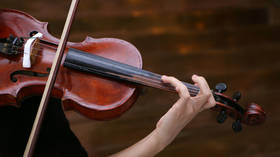Violinist quits to avoid playing Russian music – media


A Latvian violinist has decided to end her tenure at an orchestra where she worked for over a decade, after she was denied a request not to perform music by Russian composers. She argued that promoting the country’s culture is wrong amid the conflict in Ukraine.
The dispute in Latvia’s Sinfonietta Riga state chamber orchestra was revealed to the public last Friday by the ‘Culture Shock’ program on Latvian Television (LTV). The person in question is veteran musician Marta Sparnina, who has been part of the orchestra since 2009. It was founded just three years prior to her joining, with Normunds Schne serving as its artistic director since its creation.
Sparnina objected to Schne’s choice of music by Russian composers for the orchestra’s program.
“We pick Russian music for our tours and in doing so popularize this culture, willingly or not, at a time when I believe it should be silenced,” she explained.
Schne rejected the notion and made it clear during a group meeting with musicians that the program is up to him.
“We do not have a collective discussion of the repertoire in principle. People know where they come to work. They know me and know my principles for choosing the repertoire,” he said.
The Sinfonietta Riga does not perform anything based on “cooperation with the Kremlin regime or glorifies the rule of [Russian President Vladimir] Putin,” Schne added.
According to LTV, Sparnina initially sought to remain part of the Sinfonietta Riga, but be allowed to take unpaid days off to avoid performing Russian music. Its leadership denied the request, arguing that it would set a bad precedent. The next time, for example, a Lutheran could boycott a performance at a Catholic church for similar reasons, they explained.
Sparnina found some support among other musicians, according to the report, with 11 people saying in a group chat that they were on her side, eight others defending Russian music, and three saying the orchestra could ban works by modern Russian artists. The Sinfonietta Riga lists 34 performers on its website. LTV said it did not expect others to follow her lead.
Following the launch of Moscow’s military operation in Ukraine in February 2022, there was a wave of calls in some Western nations to ‘cancel’ Russian art in retaliation. Simonas Kairys, the culture minister of Latvia’s neighbor, Lithuania, claimed that Moscow was using culture as a “weapon” and called for a “mental quarantine.”
His Latvian counterpart, Nauris Puntulis, told LTV he would have dropped Russian music if he were the director, but said it is not the government’s job to make these decisions.